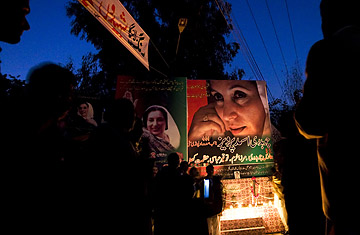
Supporters of Pakistan's slain opposition leader Benazir Bhutto pray at the site where she was killed to commemorate the first anniversary of her assassination in Rawalpindi, Pakistan
Thousands of people were on the move in Pakistan this weekend, marching in two distinctly different directions, with two different yet intertwined agendas. One group carried large party flags and raised mournful slogans. These were the supporters of the late Benazir Bhutto, who converged on the former Prime Minister's grave in the southern province of Sindh on Saturday to mark the first anniversary of her assassination. The other large mass movement was composed of Pakistani troops fanning out along the border with India — many reportedly abandoning their positions near the Afghan border — as the drumbeat of potential war between the two nuclear-armed South Asian countries grew louder. And as soldiers and the political faithful took their positions, mourning, anxiety and a measure of defiance merged. For chaotic, crisis-racked Pakistan, it was a time to mourn and, perhaps, almost a time to fight.
In Garhi Khuda Baksh, Bhutto's ancestral village, where she is buried, lines of mourners moved purposively through the winter fog to reach their slain leader's grave. Some sprinkled fistfuls of freshly cut rose petals. Some raised their cupped hands in prayer. Others fiercely beat their heads and chests, performing the matam — a Shi'a ritual to mark mourning. Most wept. (See pictures of Bhutto's village in mourning after her assassination.)
Three miles away, in Bhutto's country home, her widower and political heir mounted a platform to deal with the implications of the other large movement of people. He warned against war and appealed for peace through dialogue. "War," President Asif Ali Zardari said in a live televised address, would prove disastrous for "the whole region." Dressed in a long black coat and gripping the podium firmly with both hands, an unsmiling Zardari pushed back against what has over recent weeks been seen in Pakistan as pressure from Washington and New Delhi. "I want to tell the oldest democracy and the largest democracies of this world — listen to us, learn from us," he said. "We have lost our people," he added, in an apparent reference to the graves of four members of the Bhutto dynasty that lie near each other in the family mausoleum. "We do not talk about war. We do not talk about vengeance."
Zardari leads a government whose promise has faded over the past year, in spite of a heady few weeks of triumph after undoing the military leadership of former President Pervez Musharraf. Now Zardari has to deal with Indian charges not only that the Mumbai assailants used Pakistan as their base to organize their attacks but that Pakistan's shadowy but powerful military spy outfit, the Inter-Services Intelligence agency (ISI), may once again be linked to the radicals allegedly behind the late November assault on India's financial center. The old, poisonous contest between civilian and military leadership seems to be emerging again.
Since the Mumbai attacks, Zardari's government has maintained that it has acted responsibly, cracking down on members of Lashkar-e-Taiba, the group blamed for the attacks, and Jamaat-ud-Dawa, its affiliate charity. In response to increasingly vocal demands from New Delhi that Islamabad act more decisively, Zardari's government has argued that it cannot take any more action until it is provided with credible evidence — something Indian Foreign Minister Pranab Mukherjee says his government has already provided. (See pictures of Mumbai sifting through the rubble.)
Pakistani military and government officials insist that the movement of soldiers was a response to India's own buildup of troops along the border. Indian air force jets allegedly crossed briefly into Pakistani airspace two weeks ago. Shah Mehmood Qureshi, Pakistan's Foreign Minister, says that while Pakistan is committed to "pursuing a policy of defusing tensions," it cannot "remain oblivious to certain developments that are taking place — on the ground and in the air." "Unfortunately, there has been a lot of jingoism and irresponsible behavior. It has caused a lot of concern in Pakistan and among our neighbors," Qureshi says. "We do not want to escalate the situation. Pakistan has no aggressive designs."
